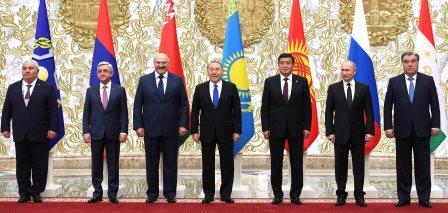1.Stanislav, at the beginning of the interview, could you please tell our readers a little about yourself?
For more than ten years, I have been engaged in the study of international relations, the development of political processes in Central Asia, the South Caucasus and the Caspian region, first as a journalist, and then, since 2010, as a research fellow at the Center for Central Asian, Caucasian and Volga-Urals Studies of the Institute of Oriental Studies of the Russian Academy of Sciences. In 2012, I defended my PhD (Candidate of Sciences) thesis “Strategic Interests of the Russian Federation in the Caspian Sea Region and Negotiations on Its International Legal Status: 1991-2011”. Currently, I am doing my 10-month fellowship at Chatham House, the Royal Institute of International Affairs, under the Russia and Eurasia Program with the support of the Robert Bosch Stiftung (Germany).
2.At present, experts take note of the trend towards expanding and deepening political and economic interaction between the countries of Central Asia. How do you see Uzbekistan’s role in these processes? Is it possible to talk about the intention of the Uzbek leadership to act as a coordinator of integration processes in the region?
Yes, indeed, the past year has seen markedly intensified contacts between the countries of Central Asia, and, undoubtedly, the transit of power in Uzbekistan played a key role in this process. The second leader of the country, Shavkat Mirziyoyev, since the very beginning of his work as a president has identified his neighbors in the region as the main foreign policy priority for Uzbekistan in the international arena, and this has proved not to be empty words. His first foreign visits were to Turkmenistan and Kazakhstan. Overall, in 2017, Shavkat Mirziyoyev visited Kazakhstan twice and paid an official visit to Kyrgyzstan in September, which was not observed for a long time. On his agenda is a trip to Tajikistan. Given the low point that the Uzbek-Tajik relations have been in for many years (it is suffice to mention here the suspension of the railway communication and the introduction of the visa regime), this visit can be deemed as a serious breakthrough for regional relations. The intensification of regional policy has already brought its results. Thus, in 2017, Uzbekistan’s trade with its neighbors increased on average by 20%, while the trade with Kazakhstan, for example, almost doubled. In general, due to its geographical location, Uzbekistan occupies a central position in Central Asia. This is the only country that has borders with all the Central Asian states. Therefore, Uzbekistan’s deviation from the isolationist policy and its transition to the policy of cooperation automatically strengthen the integration processes in Central Asia.
3.Following the meeting between U.S. President Donald Trump and Kazakh President Nursultan Nazarbayev, it was announced that the parties intended to continue developing cooperation between the United States and the Central Asian countries by using regional formats such as the C5+1 dialogue, while welcoming the future participation of Afghanistan in the projects of this dialogue platform. What is your vision of the prospects for involving Afghanistan in the work of the C5+1 diplomatic platform?
It is interesting that the United States has always viewed Afghanistan as an integral part of the Central Asian region. Most of the regional concepts and strategies prepared by American researchers and experts, in varying degrees, link Central Asia to Afghanistan. It is noteworthy that the highest point of the U.S. influence in the region fell on the period of the antiterrorist operation in Afghanistan following the terrorist attacks of September 11, 2001, when the countries of the region became allies and partners of the United States and NATO, providing their ground infrastructure and airspace for the operation. However, at present, after passing through the peak, the United States tries to realize its influence mainly through informal instruments, such as the C5+1 platform. I would not exaggerate the prospects of this format, since it does not imply, at least at this stage, any major economic, infrastructure or investment projects. Now, C5+1 is a dialogue platform designed to maintain the influence of the United States through a high-level constant political dialogue.
4.At present, two of the five Central Asian states, namely Kazakhstan and Turkmenistan, are involved in the process of settling the issue of the development of a new legal status of the Caspian Sea. At the meeting of the ministers of foreign affairs of the Caspian states held in Moscow, it was announced that the final text of the Convention on the International Legal status of the Caspian Sea had been finalized. In this context, what is your forecast regarding the prospects for holding the fifth Caspian Summit in Astana in 2018? What changes should we expect after the signing of the document that defines the new legal regime of the Caspian basin?
The Moscow Ministerial Meeting initially did not give any serious grounds for optimism. In Astrakhan in October 2014, the parties seemed to come very close to the conclusion of negotiations, but there was no breakthrough. The presidents adopted an important political statement and agreed on the size of the exclusive economic and fishing zones. However, a final convention was not eventually signed. The next meeting of the presidents on a rotation basis should take place in Kazakhstan. According to the statements of the presidents following the results of the Astrakhan summit, they were to meet in 2016. However, the meeting did not take place in either 2016 or 2017. Therefore, none of the experts expected a major breakthrough from the December meeting of foreign ministers. Nevertheless, it seems to take place.
According to the Minister of Foreign Affairs of Russia, Sergei Lavrov, following the meeting, the parties “found solutions to all remaining open issues related to the preparation of this document”. According to the minister, “the text of the convention is ready. It will be edited and translated into national languages in the near future”.
In his speech following the meeting, the head of the Russian diplomacy did not disclose the conditions under which it is planned to resolve two key issues that have been hindering the final settlement for so long, namely, the territorial issue, as well as the fate of the trans-Caspian pipeline projects.
Thus, there is a high probability that the fifth anniversary summit of the heads of the Caspian states will be held in the first half of 2018 in Astana. During the meeting of the presidents a key document for the region – the Convention on the Legal Status of the Caspian Sea – will be signed. This five-party agreement will contain the basic principles of interaction between the countries in various spheres of life from the division of the sea to the protection of its bio-environment. That is, we can speak of the end of the multi-year five-party negotiating marathon on the legal status of the Caspian basin. However, this does not mean that the convention will become a document that will solve each and every issue of cooperation of the Caspian states. More work still needs to be done to delineate the southern Caspian, to develop legal procedures for cooperation in such areas as security, ecology, protection of bio resources, etc. Therefore, the Astana summit will not be the final point in the Caspian dialogue, but will allow to upgrade its quality. Harmonization of the basic political rules of the game will make possible a more constructive solution of issues of mutual interest by developing regional cooperation.
5. In case of Vladimir Putin’s victory in the next presidential election in Russia in March 2018, Moscow is likely to retain the current foreign policy strategy in Central Asia, implementing its initiatives in the economic sphere through the EAEU, in the military sphere – through the CSTO, and in the social and cultural sphere – through the CIS. In your opinion, is there a need for a revision of Russia’s foreign policy towards the region? Does Russia have an interest in restoring political, historical and economic dominance in Central Asia?
If Putin wins, the Russian strategy in Central Asia is unlikely to change seriously. As you rightly mentioned, work will continue on the development of the EAEC as the main integration association in the region. At the same time, the optimal format for the interaction with Uzbekistan is most likely to be sought, since in general the country’s turn towards the region creates favorable opportunities for creating, for example, the sectoral cooperation under the EAEC + Uzbekistan formula. The interaction of the EAEC with another global project, such as China’s One Belt One Road Initiative, is also a serious matter. On the one hand, these two projects do not formally contradict each other: the first is aimed at creating a free trade zone and protecting local producers, while the second is aimed at developing the infrastructure linking the region with China and the EU markets. However, due to the scale of the Chinese initiative and significant financial resources involved, we can say that China is becoming a major investor in the countries of Central Asia. Russia does not have financial resources to implement projects of a similar scale. However, by building interaction with the countries of the region, Russia occupies its economic niche, which allows it to remain one of the most important trade partners for the countries of the region. At the same time, Russia, through cooperation within the CSTO and on a bilateral basis, remains the main guarantor of security in the region, especially in light of the threats coming from Afghanistan.

